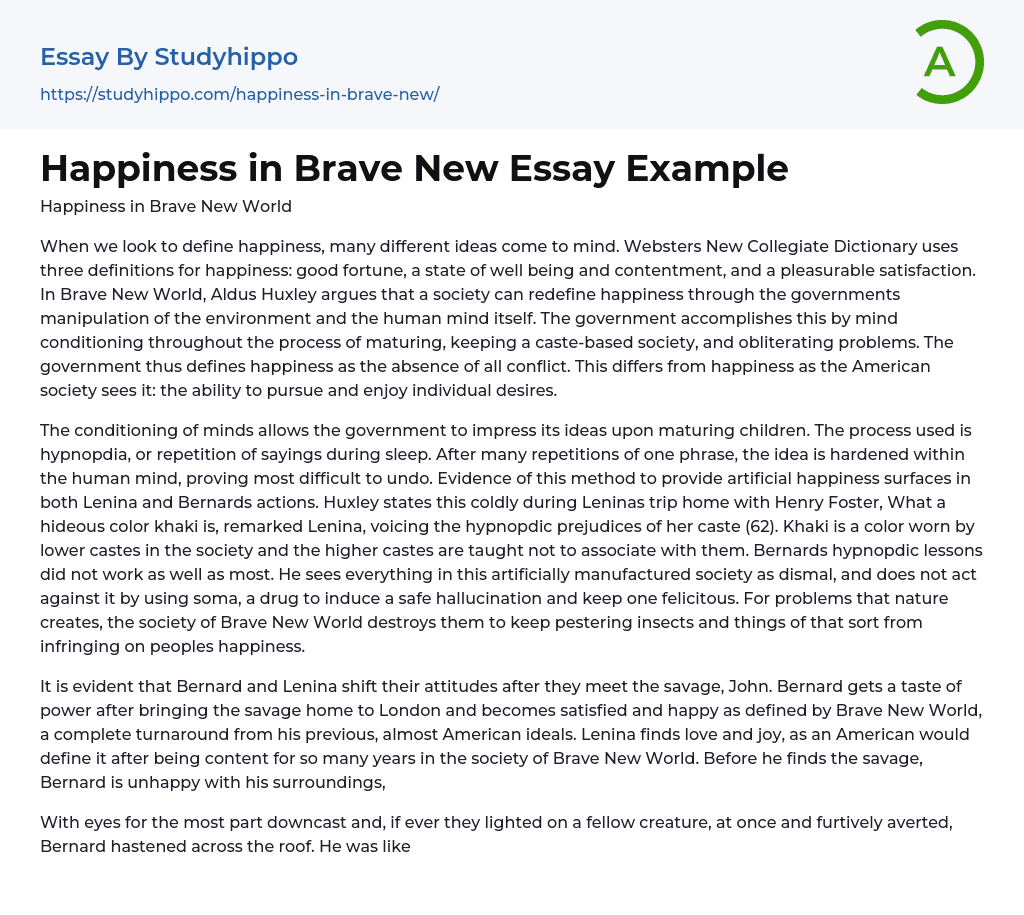Happiness in Brave New World
When we look to define happiness, many different ideas come to mind. Websters New Collegiate Dictionary uses three definitions for happiness: good fortune, a state of well being and contentment, and a pleasurable satisfaction. In Brave New World, Aldus Huxley argues that a society can redefine happiness through the governments manipulation of the environment and the human mind itself. The government accomplishes this by mind conditioning throughout the process of maturing, keeping a caste-based society, and obliterating problems. The government thus defines happiness as the absence of all conflict. This differs from happiness as the American society sees it: the ability to pursue and enjoy individual desires.
The conditioning of minds allows the government to impress its ideas upon maturing children. The process used is hypnopdi
...a, or repetition of sayings during sleep. After many repetitions of one phrase, the idea is hardened within the human mind, proving most difficult to undo. Evidence of this method to provide artificial happiness surfaces in both Lenina and Bernards actions. Huxley states this coldly during Leninas trip home with Henry Foster, What a hideous color khaki is, remarked Lenina, voicing the hypnopdic prejudices of her caste (62). Khaki is a color worn by lower castes in the society and the higher castes are taught not to associate with them. Bernards hypnopdic lessons did not work as well as most. He sees everything in this artificially manufactured society as dismal, and does not act against it by using soma, a drug to induce a safe hallucination and keep one felicitous. For problems that nature creates, the society of Brave New World destroys them to keep pestering insect
and things of that sort from infringing on peoples happiness.
It is evident that Bernard and Lenina shift their attitudes after they meet the savage, John. Bernard gets a taste of power after bringing the savage home to London and becomes satisfied and happy as defined by Brave New World, a complete turnaround from his previous, almost American ideals. Lenina finds love and joy, as an American would define it after being content for so many years in the society of Brave New World. Before he finds the savage, Bernard is unhappy with his surroundings,
With eyes for the most part downcast and, if ever they lighted on a fellow creature, at once and furtively averted, Bernard hastened across the roof. He was like a man pursued, but pursued by enemies he does not wish to see, lest they should seem more hostile even than he had supposed, and he himself be made to feel guiltier and even more helplessly alone. (63)
However, after he discovers John, he becomes just as artificial as every other conditioned human: And I had six girls last week, he confided to Helmholtz Watson. One on Monday, two on Tuesday, two more on Friday, and one on Saturday. And if Id had the time or the inclination, there were at least a dozen more who were only too anxious (158-9). Lenina, nevertheless, has a personality change in the opposite direction. Before meeting the savage, she was a typical member of Brave New Worlds society, reciting many of the hypnopdic teachings blindly, and being happy to be a member of the alpha caste, My word, said Lenina, Im glad Im not a Gamma (63).
After Johns discovery, though, she fell in love with him, an emotion that is uncouth in Brave New Worlds society, you see, Fanny, I like him (169), Lenina says this to her friend Fanny in the changing room after work one night when she is going to take John to the feelies.
Mustapha Mond, one of the world controllers, explains this societys goal of stability through happiness best in his discussion with the savage after Johns revolt:
He savage insisted obstinately, Othellos good, Othellos better than those feelies.
Of course it is, the controller agreed. But thats the price we have to pay for stability. Youve got to choose between happiness and what people called high art. We have the feelies and the scent organ instead. (226)
Brave New Worlds definition of happiness only touches upon one of Websters, a pleasurable satisfaction. The government, in order to accomplish stability, skews happiness to the point that it is not happy anymore.
- Age Of Enlightenment essays
- Ethos essays
- Time essays
- Acceptance essays
- Meaning Of Life essays
- Reality essays
- Natural Law essays
- Political Philosophy essays
- Utilitarianism essays
- Existence essays
- Free Will essays
- Good And Evil essays
- Confucianism essays
- Relativism essays
- Conscience essays
- Environmentalism essays
- Empiricism essays
- Epistemology essays
- Ethics essays
- Existentialism essays
- Human Nature essays
- Individualism essays
- Metaphysics essays
- Philosophy Of Life essays
- Transcendentalism essays
- Truth essays
- Destiny essays
- Determinism essays
- Fate essays
- Functionalism essays
- Philosophers essays
- Pragmatism essays
- Future essays
- Child Observation essays
- Critical Reflection essays
- Teaching Philosophy essays
- Personal Philosophy essays
- Action Speak Louder Than Words essays
- Can Money Buy Happiness essays
- Values of Life essays
- Ethical dilemma essays
- Normative Ethics essays
- Virtue Ethics essays
- Belief essays
- Deontology essays
- Moral essays
- Virtue essays
- Work Ethic essays
- Henry David Thoreau essays
- Carl Jung essays




